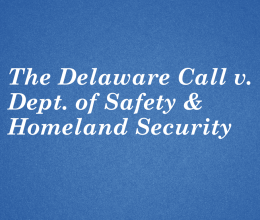Dover, DE —Today the ACLU of Delaware filed an opening brief with the Superior Court of Delaware on behalf of The Delaware Call, an independent news media group that covers Delaware issues. The brief calls for state agencies to comply with the Delaware Freedom of Information Act (FOIA) and release public records relating to the Division of Delaware State Police of the Delaware Department of Safety and Homeland Security (DSP).
In their FOIA request, the Delaware Call sought basic employment data about the state police, such as officer names and job titles, annual salaries, certification statuses, and basic demographic information that is commonly made available for other public officials and is affirmatively disclosed by other police forces nationwide. The Delaware Call did not request addresses or contact information. In its refusal to disclose the public records, the DSP inappropriately cited “privacy” and “public safety” exceptions to FOIA and reliance on the Law Enforcement Officers’ Bill of Rights (LEOBOR) to deprive the public of information that should be made available.
“FOIA exists to equip the public with information about governmental operations so that government actors can be held accountable to the people they serve,” says Dwayne Bensing, ACLU-DE legal director. “When state agencies repeatedly deprive the public of information that they are legally owed, it perpetuates a culture of secrecy that leaves the general public with a lack of trust in those officials.”
“State agencies have twisted the application of FOIA to keep the public out, rather than bring the public in, as the statute is designed to do,” says ACLU-DE legal fellow Casey Danoff. “Access to basic information about what is happening in our communities is essential for public interest groups to advocate for improvements to our communities, and for the public to advocate for themselves.”
The brief was prepared with legal research support from the Public Justice Advocacy Clinic at George Washington University Law School. While the case amplifies community calls for accountability and transparency around law enforcement, it also highlights the broader issue of inappropriate applications of FOIA among governmental bodies in the state.
“Delaware agencies erroneously broaden the very narrow exceptions to the FOIA statute to shield public information from the public, and to keep out unwanted feedback from the very people the government is designed to serve,” says Bensing. “Delawareans have the right to know about the ongoings of the agencies and public officials that serve them and receive their taxpayer dollars.”

